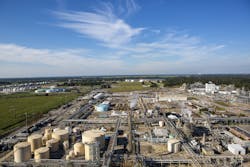BASF to expand production at Geismar chemical cluster
BASF Corp., the North American subsidiary of BASF SE, Ludwigshafen, Germany, is moving forward with a project to expand production capacity of methylene diphenyl diisocyanate (MDI) at the operator’s Verbund chemical manufacturing complex in Geismar, Ascension Parish, La., 25 miles south of Baton Rouge and 60 miles north of New Orleans (Fig. 1).
As the third and final phase of a 7-year program to expand the Geismar MDI plant’s capacity, the expansion comes as part of BASF’s strategy to meet ongoing North American MDI demand growth for production of polyurethane.
This article examines the upcoming third-phase expansion of the Geismar MDI plant and provides a brief history of previous MDI expansions at the site.
Geismar MDI expansion
Approved in mid-July 2022 and amounting to a total investment of $780 million, BASF’s proposed third expansion of the Geismar MDI plant will include the addition of several new but unidentified upstream units, as well as a new MDI splitter, that—combined with earlier expansion works—will increase the site’s overall MDI production capacity to about 600,000 tonnes/year (tpy) from its original 300,000-tpy capacity, BASF said.
The final-phase expansion itself will boost Geismar’s MDI production capacity by about 200,000 tpy, according to BASF operating data.
Alongside new units, BASF said the project will entail implementation of advanced digitalization technologies into plant operations to improve production reliability and efficiency.
To secure the final phase of BASF’s Geismar MDI project, the state of Louisiana offered an incentive package that includes a $1 million retention and modernization tax credit to be claimed in equal installments over 5 years. BASF will also have access to Louisiana’s Industrial Tax Exemption and Quality Jobs programs, Louisiana Economic Development (LED) said in a mid-July 2022 release.
Scheduled for start of construction this year and targeted for completion by yearend 2025, this final leg of the MDI plant expansion will complete BASF’s three-phased program to increase MDI production capacity at Geismar first revealed by the operator in 2016 and officially undertaken in 2018. Upon its conclusion, the stepwise, 7-year expansion project will amount to a more-than $1-billion combined capital investment, BASF said.
Earlier phases
BASF most recently completed the second phase of its Geismar MDI expansion in late 2021. Second-phase expansion works—which included increasing capacity of several unidentified upstream units at the site—increased Geismar’s overall MDI production capacity by about 100,000 tpy to 400,000 tpy (Fig. 2).
Completed in October 2020, Phase 1 of the Geismar MDI capacity increase program involved installation of a new MDI synthesis unit that, while increasing production capacity only incrementally, equipped the plant for the future capacity growth included in the second and third phases of the program (Fig. 3).
As part of the first-phase expansion, BASF also decommissioned an existing, outdated MDI synthesis unit at Geismar.
BASF began planning and engineering on the stepwise MDI expansion at Geismar in 2016.
While the operator produces about 1.92 million tpy of MDI across its global production sites, BASF said its decision to dedicate investments into expanding MDI capacity at Geismar specifically resulted from the site’s access to existing infrastructure; reliable, competitively priced raw feedstocks sourced from regional shale gas production; and sustained support from Louisiana state and local governments.
BASF’s Geismar chemical operations, which began in 1958, consist of 32 plants in 10 clusters spread across three locations.
Additional expansion plan
In late-June 2022, BASF also announced plans to increase production capacity for key specialty amines at Geismar. The proposed amines expansion specifically will enable BASF’s Geismar operations to increase output of key polyetheramines and tertiary amines for use across the industrial sector.
While the operator revealed no further details regarding the proposed project, BASF did confirm the Geismar amines expansion is scheduled for startup in mid-2023.
About the Author
Robert Brelsford
Downstream Editor
Robert Brelsford joined Oil & Gas Journal in October 2013 as downstream technology editor after 8 years as a crude oil price and news reporter on spot crude transactions at the US Gulf Coast, West Coast, Canadian, and Latin American markets. He holds a BA (2000) in English from Rice University and an MS (2003) in education and social policy from Northwestern University.

